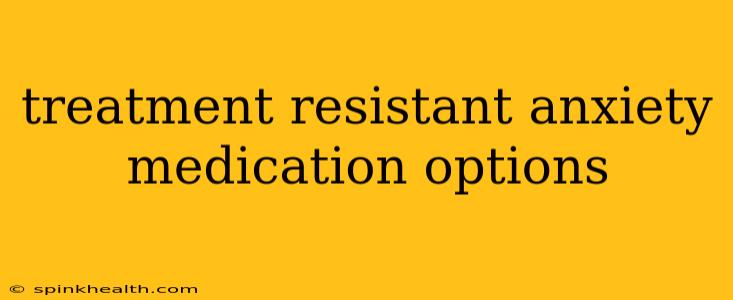Anxiety. That persistent feeling of unease, the knot in your stomach, the racing heart – it can feel like a relentless shadow, dimming even the brightest days. For many, medication offers a lifeline, easing the grip of anxiety and allowing them to live more fully. But what happens when the usual medications don't work? What if you've tried multiple antidepressants and anxiolytics, yet the anxiety persists? This is the frustrating reality of treatment-resistant anxiety. This isn't a failure; it's a challenge, and there are options. Let's explore the paths forward.
My name is Dr. Evelyn Reed, and I've spent years working with individuals struggling with treatment-resistant anxiety. I understand the despair and the sense of hopelessness that can accompany this experience, and I want to assure you that you're not alone. This article aims to illuminate some of the avenues available, helping you navigate this difficult terrain with knowledge and hope. Remember, always consult your doctor or psychiatrist before making changes to your medication regimen.
What is Considered Treatment-Resistant Anxiety?
Treatment-resistant anxiety is typically defined as a lack of sufficient response to at least two different classes of anxiety medication, given at adequate doses and durations. This doesn't mean you haven't experienced any relief; it means the improvement wasn't substantial enough to manage your symptoms effectively. Each person's experience is unique, and your psychiatrist will consider your individual circumstances and symptoms.
What Medications Are Typically Tried First?
Before exploring alternative options, it's helpful to understand the typical first-line treatments:
- Selective Serotonin Reuptake Inhibitors (SSRIs): These are often the initial choice, targeting serotonin levels in the brain. Examples include sertraline (Zoloft), paroxetine (Paxil), and fluoxetine (Prozac).
- Serotonin-Norepinephrine Reuptake Inhibitors (SNRIs): These affect both serotonin and norepinephrine levels. Venlafaxine (Effexor) and duloxetine (Cymbalta) are common examples.
- Benzodiazepines: These are fast-acting medications that can provide immediate relief, but they're usually used short-term due to the risk of dependence. Examples include alprazolam (Xanax) and lorazepam (Ativan).
If these initial treatments aren't effective, your doctor might consider other options.
What Other Medications Might Be Considered for Treatment-Resistant Anxiety?
When standard medications fail, several other approaches can be explored:
- Augmentation Strategies: This involves adding another medication to your existing treatment. This could include mood stabilizers like lamotrigine (Lamictal) or antipsychotics in low doses, carefully chosen by your doctor.
- Different Classes of Antidepressants: Exploring different classes of antidepressants, such as tricyclic antidepressants (TCAs) or monoamine oxidase inhibitors (MAOIs), might provide relief. However, these often come with more side effects and require careful monitoring.
- Off-Label Use of Medications: Some medications, approved for other conditions, might be used off-label to treat anxiety under strict medical supervision. Your psychiatrist would carefully evaluate the risks and benefits before recommending this approach.
What Other Treatments Can Help Alongside Medication?
Medication is often only one piece of the puzzle. Other therapies can greatly complement pharmaceutical interventions:
- Cognitive Behavioral Therapy (CBT): CBT helps you identify and change negative thought patterns and behaviors that contribute to anxiety.
- Exposure Therapy: This gradually exposes you to anxiety-provoking situations in a safe and controlled environment, helping you build resilience.
- Mindfulness and Meditation: These practices can promote relaxation and reduce stress.
What if Medication and Therapy Still Aren't Enough?
Even with a combination of medication and therapy, some individuals continue to struggle. In these cases, it's crucial to explore all available options with your healthcare provider. They might consider:
- Ketamine infusions: Though still being researched extensively, ketamine infusions have shown promise in severe cases of treatment-resistant depression and anxiety.
- Transcranial magnetic stimulation (TMS): This non-invasive procedure uses magnetic pulses to stimulate areas of the brain.
- Deep brain stimulation (DBS): This highly specialized procedure involves implanting electrodes into the brain. This is typically a last resort for individuals with severe treatment-resistant conditions.
How Can I Find a Doctor Who Specializes in Treatment-Resistant Anxiety?
Finding the right specialist is crucial. You can start by asking your primary care physician for referrals, researching psychiatrists specializing in anxiety disorders, and checking with local mental health organizations.
Remember, finding the right approach takes time and patience. Don't hesitate to advocate for yourself and keep communicating openly with your doctor or psychiatrist. With persistence and the right support, you can find relief from treatment-resistant anxiety and reclaim your life.

